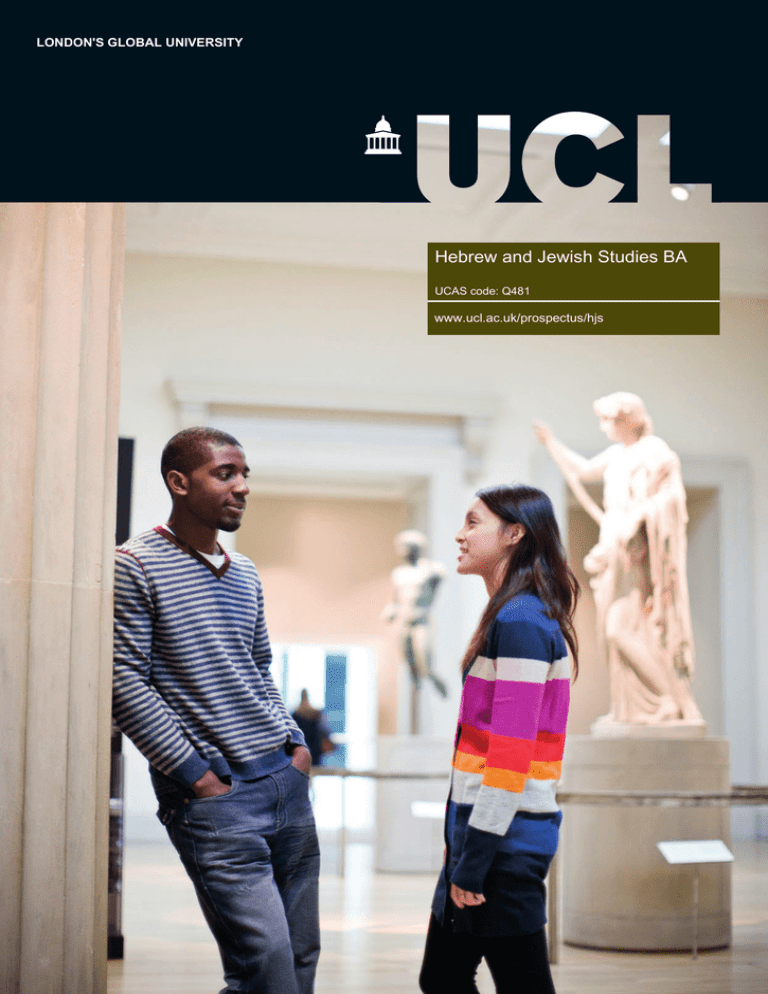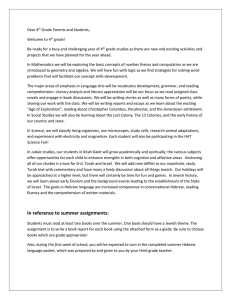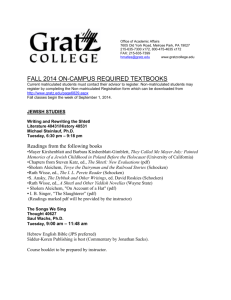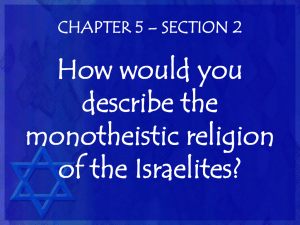Hebrew and Jewish Studies BA LONDON'S GLOBAL UNIVERSITY www.ucl.ac.uk/prospectus/hjs UCAS code: Q481
advertisement

LONDON'S GLOBAL UNIVERSITY Hebrew and Jewish Studies BA UCAS code: Q481 www.ucl.ac.uk/prospectus/hjs Hebrew and Jewish Studies BA The three-year full-time (six-year part-time) Hebrew and Jewish Studies BA aims to develop students' knowledge and understanding of all aspects of Jewish culture, including its languages, literature and history. Degree summary • UCL Hebrew & Jewish Studies is the only department of its kind in the UK, and is highly regarded worldwide. • We teach a wide range of courses in Jewish history, politics and culture. • As part of your degree you can study both ancient and modern languages, including Biblical, Rabbinic, and Modern Hebrew, Aramaic, Syriac, Ugaritic, and Yiddish. • During your time in the department you will have access to a remarkable collection of Hebrew, Yiddish and Judaica books in the UCL Library, as well as to the special collections in the British Library, Wiener Library and the National Archives. In your first year you will take compulsory courses in Modern Hebrew and Biblical Hebrew or Yiddish as well as a range of optional history, literature, and culture courses, providing an overview of the subject which allows you to identify your own areas of specialist interest for later study. In your second year you will take a compulsory course in Modern Hebrew and choose from a wide range of options encompassing a vast chronological and geographical span and also an array of disciplinary approaches, such as history, literature, philology, gender studies and politics. In your final year you will take three optional courses and will write a dissertation on a subject of our choice. You can find out about part-time study options by contacting the Hebrew and Jewish Studies department directly. Your learning The department uses a variety of teaching methods; classes are mostly small and intimate, encouraging active participation by the students. Modern language study includes oral work, reading comprehension, listening comprehension and translation exercises. All other subjects are taught by lectures and seminars. Most courses are assessed by a combination of essays and an end-of-year written examination, in addition to other types of coursework such as presentations. Modern language courses are also assessed by oral examinations. Your career The programme develops a wide range of skills such as critical thinking, oral and written communication, and time management, in addition to linguistic ability, which will beneficial for a wide range of careers. Our graduates take up employment in diverse fields including law, teaching (primary and secondary), banking and finance, journalism, publishing, the museum sector, and librarianship. Many choose to pursue postgraduate study, either continuing within Hebrew and Jewish studies or moving into different fields such as history, digital humanities, linguistics, religious studies, and others. • • • • • Full-time PhD student, Hebrew University of Jerusalem Librarian, British Library Trainee Barrister, London Researcher/Writer, Chambers and Partners Legal Guides Project Worker, Barnardos Degree structure In each year of your degree you will take a number of individual courses, normally valued at 0.5 or 1.0 credits, adding up to a total of 4.0 credits for the year. Courses are assessed in the academic year in which they are taken. The balance of compulsory and optional courses varies from programme to programme and year to year. A 1.0 credit is considered equivalent to 15 credits in the European Credit Transfer System (ECTS). Year One (full-time) Compulsory courses Introduction to Biblical Hebrew or Elementary Yiddish Modern Hebrew for Beginners Sources, Methods, and Skills Optional courses You will select three of the following 0.5 credit options (the selection varies each year): Introduction to Biblical and Rabbinic Literature Introduction to Hebrew Literature: Medieval to Modern Introduction to Jewish Languages Introduction to Jewish Philosophy and Mysticism Introduction to Israeli Culture, Society and Politics Introduction to Modern Jewish Literature Introduction to the Study of Judaism Survey of Jewish History 1: The Ancient and Medieval Near East Survey of Jewish History 2: From Medieval to Early Modern Europe Survey of Jewish History 3: The Modern World Year Two (full-time) Compulsory course Lower Intermediate Modern Hebrew Optional courses You will select 3.0 credits from a wide range of options in the following areas: Hebrew, Yiddish and other Jewish languages; Jewish history and culture; literature and politics. Alternatively, 1.0 credit can be selected from another subject area by arrangement with the relevant department. Final Year Compulsory courses (full-time) Final-year dissertation (1.0 credit) Optional courses You will select 3.0 credits from a wide range of options in the following areas: Hebrew, Yiddish and other Jewish languages; Jewish history and culture; literature; and politics. Please note:You can find out about part-time study options by contacting the Hebrew and Jewish Studies department directly. Entry requirements A levels A level grades ABB A level subjects No specific subjects AS levels For UK-based students a pass in a further subject at AS level or equivalent is required. GCSE English Language at grade B, plus Mathematics at grade C. For UK-based students, a grade C or equivalent in a foreign language (other than Ancient Greek, Biblical Hebrew or Latin) is required. UCL provides opportunities to meet the foreign language requirement following enrolment, further details at: www.ucl.ac.uk/ug-reqs IB diploma IB points 34 Subjects A score of 16 points in three higher level subjects, with no score lower than 5. The selection process is conducted on the basis of your UCAS application and personal statement. If you receive and offer of a place on the programme, you will be invited to visit UCL Hebrew & Jewish Studies and tour the campus. Fees UK/EU fee £9,000 (2016/17) Overseas fee £16,130 (2016/17) Notes Details about financial support are available at: www.ucl.ac.uk/study/ug-finance Contacts Contact Professor Michael Berkowitz Admissions Tutor Email m.berkowitz@ucl.ac.uk Telephone +44 (0)20 7679 7171 Prospectus entry www.ucl.ac.uk/prospectus/hjs Key facts Other qualifications REF Full lists of all degree programmes and other entry requirements can be found on our website at: www.ucl.ac.uk/otherquals 78% rated 4* (‘world-leading’) or 3* (‘internationally excellent’) Department Hebrew and Jewish Studies Faculty Arts & Humanities Undergraduate Preparatory Certificates UCL's Undergraduate Preparatory Certificates (UPCs) are intensive one-year foundation courses for international students of high academic potential, who are aiming to gain access to undergraduate degree programmes at UCL and other top UK universities. For more information see our website: www.ucl.ac.uk/upc Your application Application for admission should be made through UCAS (the Universities and Colleges Admissions Service). Applicants currently at school or college will be provided with advice on the process; however, applicants who have left school or who are based outside the United Kingdom may obtain information directly from UCAS. In your application we will be particularly interested in your motivation to study the subject, and of your interest in broad matters of language, literature and culture. We will also be interested to learn of experiences you may have had relating to Jewish Studies, such as courses attended, museums visited, travel, and wider reading. PDF Updated: February 19, 2016 Information correct at time of going to press. See website (www.ucl.ac.uk/prospectus/hjs) for latest information






